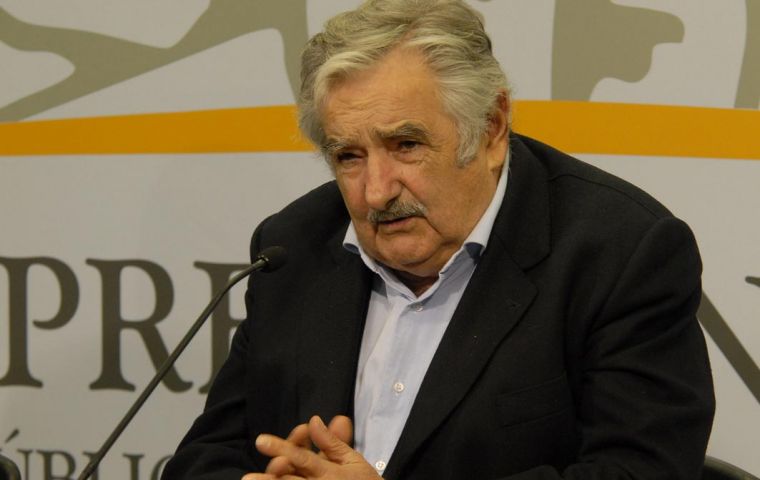MercoPress. South Atlantic News Agency
Uruguay president Mujica approval rating plunges 29 points in 15 months
 Mujica’s ‘back and forth’ baffled even the ruling coalition
Mujica’s ‘back and forth’ baffled even the ruling coalition The approval of Uruguayan president Jose Mujica in Montevideo continues to slide and has plummeted eight points between February and May according to a Mori public opinion poll released this week.
When president Mujica took office in March 2010 his support was 75%, however between June last year and May 2011 his rating plunged from 73% to 44%, (29 points) in the Uruguayan capital which is the electoral stronghold of the ruling coalition.
In the same period disapproval of President Mujica increased from 27% to 35%, which leaves him with 9 positive points, while 21% of Montevideo residents interviewed for the poll preferred to remain silent.
Mujica approval begun to slip in August 2010 when he lost four points compared to the previous June. The Mori poll was ordered by the government of the city of Montevideo and was released by the semi-official news agency Uy Press.
At national level the poll shows a similar sliding evolution, which confirms a drop in the support of the ruling coalition and President Mujica.
However poll experts said the fall in support is similar to that suffered by former President Tabare Vazquez during his first 18 months in office five years ago. “It’s normal for governments to loose support during the first year of their mandate”.
Members of President Mujica’s Popular Participation Movement, MPP, the leading force in the ruling coalition attributed the slide to the recent discussions on the Expired Crimes Law, a kind of amnesty bill which prevents military and police personnel allegedly involved in human rights abuses during the dictatorship (1973/1985) from been taken to court to face charges.
The 1986 matching bill (to another approved for the guerrillas and supporters in 1985) was twice ratified by referendums in 1989 and 2009 which technically makes it doubtful it can be annulled.
Precisely this controversy which split the ruling coalition and Mujica’s attitude first supporting the annulment, later warning it was not wise to do so and finally calling on all lawmakers to vote their conscience even if it meant repealing it, made things worse.
Furthermore Uruguayan constitutional experts said Parliament was not entitled to annul a bill with double referendum ratification in a twenty year period.
It also surfaced that Mujica, a former urban guerrilla leader and several members of the organization in the eighties when the return of democracy in informal meetings had agreed with the Uruguayan military that the 1986 amnesty would not be questioned.
MPP Deputy Anibal Esteban Perez said that “the repeated back and forth regarding the annulment of the 1986 bill left the feeling that the President was not in full command, and even when this is not the case, it was well exploited by the conservatives”.
“I think this loss in support is linked as to how the 1986 amnesty bill debate was managed and the same personality of the president”, said MPP Senator Hector Tajam.
Carlos Varela, a non MPP member from the ruling coalition said a 44% approval in the first year “is not a matter of concern. It should be compared with how other presidents performed in the same period”.




Top Comments
Disclaimer & comment rules-

Read all commentsAnd we are concerned in Chile because our President has had a fell of some 10 points fron is election .....!!!
Jun 18th, 2011 - 02:00 pm 0Well, that means here he his doing his duty well, then.....in spite of the “concertación” coalition that have been the most destructive and negative seen from the return of the democracy.......
Commenting for this story is now closed.
If you have a Facebook account, become a fan and comment on our Facebook Page!